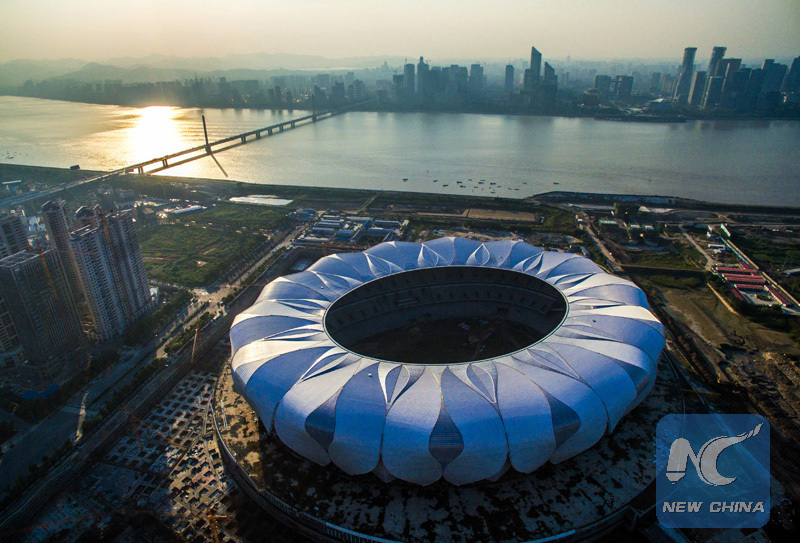China's active role in G20 Hangzhou summit
- By He Jingjun
 0 Comment(s)
0 Comment(s) Print
Print E-mail China.org.cn, June 4, 2016
E-mail China.org.cn, June 4, 2016
|
|
|
Photo taken on Sept. 16, 2015 shows the Olympic Center in Hangzhou, capital of east China's Zhejiang Province. China will host the 2016 Group of Twenty (G20) summit in Hangzhou. [Xinhua/Xu Yu] |
May 27 marked the start of the 100-day countdown to the 2016 G20 summit to be held in Hangzhou, the capital city of east China's Zhejiang Province. The Ministry of Foreign Affairs held a briefing for Chinese and foreign media in Beijing on May 26, during which Foreign Minister Wang Yi briefed on preparations for the event.
"China, as the host country, deeply feels its great responsibility," Wang said, explaining the country hopes the summit will "focus on the core challenges and crucial problems facing the world economy." China, he pledged, would "work with all participating parties to find joint solutions and contribute its wisdom."
The Group of 20 (G20) is an international forum for the 20 major economies with an aggregate gross national product (GNP) accounting for 90 percent of the world total. The G20 summit has been held 10 times, and the world is full of expectations for the role China will play as host this year.
For a long time, China has been a big contributor to global economic growth, with its contribution rate once reaching 60 percent, and even in the present reduced "new normal" economy, the figure still stands at 30 percent, the highest in the world.
Regretfully, the "big contributing country" does not consequentially having the corresponding discourse in the governance system. It still faces criticism from a number of countries, who accuse it of slowing down its own economic growth in a way that "threatens" the world's economic recovery. This is quite unfair, and China needs to respond effectively.
The G20 Hangzhou summit provides such an opportunity. As host, it should set and promote the agenda. At the same time, it should also actively play the role of a "coordinating country" in communications between G20 members and non-member countries and with important international organizations to achieve the most extensive consensus.
The more Chinese coloring that emerges from the Hangzhou summit, the more its weight in the G20 governance system can improve; in turn, China's efforts will promote the overall prestige of the G20.
In setting the Hangzhou agenda, China has established "building an innovative, invigorated, interconnected and inclusive world economy" as the main theme. It has proposed four key priorities, namely, "innovative growth modes," "more efficient global economic and financial governance," "robust international trade and investment" and "inclusive and interconnected development."
This effectively responds to all sorts of "upstream" elements in the current world economy, such as trade protectionism, anti-globalization moves, regionalism, the irresponsible export of inflation and even competitive currency devaluation not conducive to world financial stability.
China aims to focus on the world economy and global environment which it sees as the "G20's job" and it won't mix things up with its "private affairs." This makes the world's expectations for the G20 much clearer. In addition, as for the old, unequal economic order, China advocates "innovation" conforming to the trends of the times.
Altogether, the Hangzhou summit is an opportunity for both China and the world. China is at a critical moment in seeking a "leading role" and should assume the heavy responsibility as its due to promote global economic governance.
However, new emerging economies represented by the BRICS (Brazil, Russia, India, China and South Africa) within the G20 have encountered economic problems in recent years. Some have suffered economic slowdown or negative economic growth, so their influence within the G20 framework has weakened.
The role of China, the only emerging economy still able to play a key role in world economic growth has become particularly distinctive. The more suggestions China can offer the world economy, the more active its role can be in maintaining the status of the G20 as the world's highest-level economic meeting.
At the 10th G20 summit held in Antalya of Turkey last year, President Xi Jinping delivered an important speech entitled "Innovative Growth that Benefits All." He pointed out that China has the confidence and ability to sustain a medium to high growth rate and continue to create opportunities for all countries to develop. He said that China's new growth momentum is accelerating and in the coming five years will release a huge demand and become the world's new source of growth.
The "China plan" proposed at Antalya was a strong step that China has taken to become a big country in global economic governance within the G20 framework. Now, it needs to seize the opportunity of hosting the G20 summit to continue to carry things forward.
The writer is a researcher with the Charhar Institute.
This article was translated by Li Jingrong based on the original unabridged version published in Chinese.
Opinion articles reflect the views of their authors, not necessarily those of China.org.cn.







Go to Forum >>0 Comment(s)